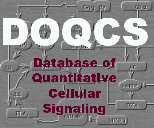| |
Name | Accession
Type | Initial
Conc.
(uM) | Volume
(fL) | Buffered | Sum Total Of |
| 1 | craf-1 | Network | 0.2 | 0 | No | - |
| | Strom et al 1990 Oncogene 5 pp 345-51 report high general expression in all tissues. Huang and Ferrell 1996 PNAS 93(19):10078 use a value of 3 nM for oocytes. Here we stick with a much higher expression based on the Strom report. |
| 2 | craf-1* | Network | 0 | 0 | No | - |
| | Singly phosphorylated form of c-raf-1. This is the form that gets best activated by GTP.Ras. |
| 3 | MAPKK | Network | 0.18 | 0 | No | - |
| | Conc is from Seger et al JBC 267:20 pp14373 (1992) mwt is 45/46 Kd We assume that phosphorylation on both ser and thr is needed for activiation. See Kyriakis et al Nature 358 417 1992 Initial concentration is 0.18 |
| 4 | MAPK | Network | 0.36 | 0 | No | - |
| | Mol wt is 42 KDa. conc is from Sanghera et al JBC 265 pp 52 (1990) They estimate MAPK is 1e-4x total protein, and protein is 15% of cell wt, so MAPK is 1.5e-5g/ml = 0.36uM. Lets use this. Note though that Huang and Ferrell 1996 PNAS 93(19):10078 report 1.2 uM in oocytes. Also note that brain concs may be high. Ortiz et al 1995 J. Neurosci 15(2):1285-1297 report 0.3 ng/ug protein in Cingulate Gyrus and 1.2 ng/ug protein in nucleus accumbens. In hippocampus 270 ng/mg protein for ERK1 and 820 ng/mg protein for ERK 2. If 15% of cell weight is protein, that means that about 300 * 0.15 ng/ul is ERK 1. ie, 45e-9g/1e-6 litre = 45 mg/litre or about 1 uM. For non-neuronal tissues a lower value may be better. |
| 5 | craf-1** | Network | 0 | 0 | No | - |
| | Negative feedback by MAPK* by hyperphosphorylating craf-1* gives rise to this pool. Ueki et al JBC 269(22):15756-15761, 1994 |
| 6 | MAPK-tyr | Network | 0 | 0 | No | - |
| | Haystead et al FEBS Lett. 306(1) pp 17-22 show that phosphorylation is strictly sequential, first tyr185 then thr183. |
| 7 | MAPKK* | Network | 0 | 0 | No | - |
| | MAPKK phosphorylates MAPK on both the tyr and thr residues, first tyr then thr. Refs: Seger et al JBC267:20 pp 14373 1992 The MAPKK itself is phosphorylated on ser as well as thr residues. Let us assume that the ser goes first, and that the sequential phosphorylation is needed. See Kyriakis et al Nature 358 417-421 1992 |
| 8 | MAPKK-ser | Network | 0 | 0 | No | - |
| | Intermediately phophorylated, assumed inactive, form of MAPKK |
| 9 | Raf-GTP-Ras* | Network | 0 | 0 | No | - |
| | This is the main activated form of craf. It really refers to the complex of GTP-Ras with phosphorylated Raf. See Leevers 1994 Nature 369:411-414 and Hallberg et al 1994 JBC 269(6):3913-3916. The naming is a bit awkward but kept in this model for consistency with previous models (Bhalla and Iyengar 1999 Science 283:381-387) |
